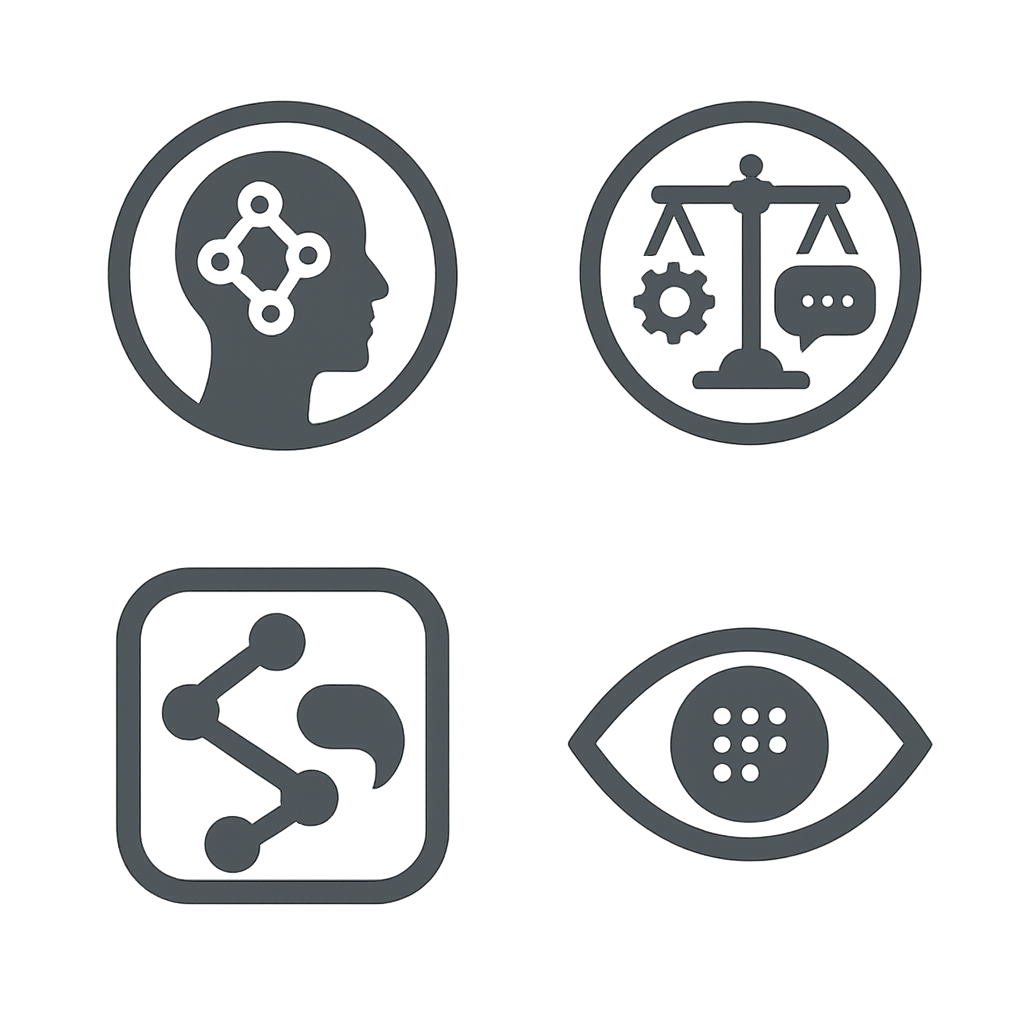I read AI through Marx and Engels as a reorganization of labor and power rather than a marvel of “a-intelligence.” Once I follow capital’s search for profit into data, code, and platforms, the question shifts from what the model can do to who controls the means of computation—and who gains or loses time, income, and authority (Marx 1867/1976).
Why Marx & Engels—why now?
They offer a toolkit for seeing AI as part of capitalism’s long arc: machines embedded as fixed capital, new rounds of labor discipline, and recurring struggles over the working day, wages, and control of production (Marx 1867/1976; Engels 1845/2009).
Five Marx–Engels lenses on AI
1) AI as fixed capital and the “general intellect.” In the Grundrisse, Marx anticipates a phase where scientific knowledge becomes a direct productive force and lives in machinery—what later readers call the “Fragment on Machines.” Today’s models look like precisely such fixed capital: expensive, centralized systems embodying collective knowledge and owned by a few firms (Marx 1857–58/1973).
2) Relative surplus value and algorithmic management. In Capital Marx shows how machinery raises productivity to cheapen labor-power and intensify extraction; it describes the separation of the “intellectual powers of production” from workers and their conversion into capital’s command. Platform dashboards, monitoring, and automated rate-setting extend that logic to warehouses, ride-hail, and office work (Marx 1867/1976).
3) Discipline, authority, and the new factory. Engels’s studies of English industry connect technology to factory discipline, health, and authority. He would see algorithmic schedules and automated performance flags as a modern regime of command that must still justify itself to those who labor under it (Engels 1845/2009; 1872/1873).
4) Alienation and fetishism, updated. When firms and governments treat models as autonomous decision-makers, social relations appear as relations between things—what Marx calls commodity fetishism. Reflexive research should demystify these relations by showing the human labor, datasets, and institutional choices standing behind the “AI” (Marx 1867/1976).
5) Centralisation and class struggle. From the Manifesto onward, Marx and Engels argue that capitalism concentrates means of production and socializes labor at scale. AI’s heavy fixed costs (compute, data centers, IP) reproduce that centralization, and invite counter-organization—unions, co-ops, public compute, and democratic oversight (Marx & Engels 1848/2015).
Three concrete applications
Logistics & delivery. Routing algorithms raise labor intensity while shifting risk (vehicle, weather, demand) onto workers paid by the task. A Marxian audit would track how much surplus value is recovered by rate changes vs. genuine productivity, and who holds authority when the algorithm is “wrong” (Marx 1867/1976; Engels 1872/1873).
Office AI (coding, documents, CRM). Tools promise liberation from drudgery, yet metrics can expand output targets and normalize surveillance. Marx’s warning about the “intellectual powers of production” migrating to capital helps analyze how prompts, codebases, and review tools reorganize discretion at work (Marx 1867/1976). :contentReference[oaicite:8]{index=8}
Public services & scoring. Automated eligibility and risk systems embody a political choice about who counts and on what evidence; for Marx and Engels, these are struggles over reproduction of labor-power and the social wage, not neutral optimizations (Engels 1845/2009).
What they would push for (near-term)
- Shorter working time as the first dividend of automation, not mass layoffs.
- Collective voice in AI deployment (bargaining over data, metrics, and speed).
- Social ownership of key infrastructures—public compute and open standards where feasible.
- De-fetishize models through transparency about data provenance, human labor, and decision rights.
How I’d study this with students (toolkit)
- Value-chain map: follow money from buyer to platform to investor; identify rent positions (IP, data access, cloud).
- Labor diary + rate study: compare promised vs. realized time savings; trace how KPIs reset expectations.
- Authority audit: document who can override the system and with what remedy (Engels 1872/1873).
- General-intellect probe: inventory which tacit skills moved from workers into prompts, templates, and code; who now owns them (Marx 1857–58/1973).
Where this fits in the series
Alongside Elias, Marx & Engels give me a structural baseline. Their question—who commands the means of computation, how is living labor organized around it, and which institutions convert technical possibility into social time—helps me read AI as a moving power relation rather than a marvel of code (Marx 1867/1976; Marx & Engels 1848/2015).
Literatur
Engels, F. (2009). The condition of the working class in England (V. Kiernan, Ed.; T. Hunt, Intro.). Penguin Classics. The condition of the working class in England.
Engels, F. (1873). On authority. Marxists Internet Archive (online edition). On authority.
Marx, K. (1973). Grundrisse: Foundations of the critique of political economy (M. Nicolaus, Trans.). Penguin Classics. Grundrisse.
Marx, K. (1976). Capital, volume I (B. Fowkes, Trans.). Penguin Classics. Capital, volume I.
Marx, K., & Engels, F. (2015). The Communist Manifesto (G. Stedman-Jones, Ed.). Penguin Classics. The Communist Manifesto.


Schreibe einen Kommentar